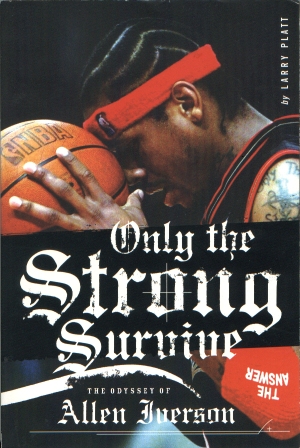By Larry Platt
![]()

![]()
Ranking: ![]()
![]()
![]()
![]()
One of the things I look for in a basketball biography is a person with an interesting story. Allen Iverson certainly qualifies.
This biography is written by Larry Platt, the unofficial hip-hop hoops biographer and author of Keepin' It Real. Platt tells Iverson's story, starting with his mother's upbringing through Iverson's - starting with his life in the rough Newport News, Virginia ghetto, through his 2-year college stint at Georgetown and through first six seasons in the NBA with the Philadelphia 76ers.
The best part about the book is that it goes into detail on many of the controversial events of Iverson's life: the bowling alley incident in high school, his "practice" rant to the media, his arrest for allegedly throwing his naked wife out of his house, his rap album, his "disrespect" of Michael Jordan, and his relationship with Larry Brown. The media worked overtime to paint him as a 1-dimensional thug, but it never seemed to add up when you saw him dote over his children in interviews: this doesn't jibe for a guy who wants to be a thug at all costs. I mean, seriously, a warm spot for kids? Platt paints a more complete picture of Iverson, adding depth to the media characture. He exposes where the media screwed up by not correcting their own mistakes, and on occasion why they would hold a grudge. He explains Iverson's problems with Larry Brown (as well as Brown's with Iverson, which was mentioned numerously by the press). He also explains Iverson's close relationships with his friends and mentors.
Platt is one of the best authors at explaining the hip hop generation. His writing is quick, easy, and entertaining. He goes into detail about the problems white middle class America has with embracing a hip hop superstar. However, his weakness is, just as it was with Keepin' it Real , is that he goes overboard in rationalizing his subject material. He adds depth to their character, but never paints a complete 3-dimensional picture. It appears he is too attached to his subjects to be objective. Once again, true to form, you find him reaching for straws at points - working a little too hard at canonizing Iverson. He mentions, but doesn't dwell on Iverson's unreliability to meet commitments, such as the aforementioned practice, or his skipping school, tutoring sessions, or even Magic Johnson's charity game. One of the worst sidestepping jobs dealt with Iverson's rap album. One of the excerpts from the song 40 Bars was "Come to me with faggot tendencies, you be sleeping where the maggots be." Platt does explain that rappers tell stories about life in the hood as 3rd person accounts as fictionalized characters and shouldn't be taken any more seriously than an author telling a story. Platt goes on to explain that Iverson was upset to think he offended people by his use of the word "faggot" which he says was a hip-hop synonym for "weak" without regard to sex, and he leaves it at that. I told this to a gay friend I know who likes hip hop and basketball and she said it is offense and if she used the "N" word and told Iverson, "Don't be offended by it. I use it to mean a stupid person, without regard to race" it would be equally as absurd, as Iverson's stereotype-based slurs supposedly surprised him. I believe Platt should have looked at the the gripes people had with the record, rather than just telling Iverson's rationalization and leaving it at that. This type of one-sided reporting pops up on more than one occasion.
The strength of book is Platt explaining how Iverson's rough and hard background shaped him into the player that he became in the NBA. The other strength is his explanation of Iverson's marketing appeal. Since Jordan had broke into the league, the sponsors had been looking for the next Jordan: polite, non-threatening, and photogenic - the kind of African-American athlete who transcends race and makes middle class white America feel comfortable. The search had turned up empty, as Anfernee Hardaway, Grant Hill, and Shaquille O'Neal were unable to completely fill the Jordan mold. Iverson refused to go along with this. He viewed the Nike-type opinion-less and harmless character like Michael Jordan and Tiger Woods to be phony people who read what was handed to them and pretended to be somebody else in order to make money. Iverson insisted on "keeping it real." He was who he was and if you didn't like him, he didn't care, because making you happy isn't his priority. Reebok (his shoe sponsor) respected his wishes, and rather than find the next Jordan/Dr. J who would bridge the middle-class white America gap, they burned the bridge, but created a bigger bridge: to the youth of America, who liked the Anti-hero and could relate to Iverson, as their parents and authority figures didn't approve of their friends and their haircuts and/or tattoos. Reebok had done the unthinkable: they threw out the conventional wisdom of sports marketing and re-wrote the laws, and created the next big thing.
If you are a fan of Iverson, definitely read it. If you aren't a big fan of his, but find him interesting or intriguing, and would like to learn more about him - because believe me, everything you thought you knew was wrong - then read it. If you have made up your mind that he is a hooligan and represents all that is wrong in basketball and nothing is going to change your mind, then don't waste your time. I'm not saying you have to think the guy is a pure saint, because he isn't, but there is more to him than meets the eye.
Introspection: 3
Insight: 3
History: 1997-2002 (NBA timeframe)
Readability: 4
Only the Strong Survive The Odyssey of Allen Iverson. Larry Platt. Regan Books. 2002.